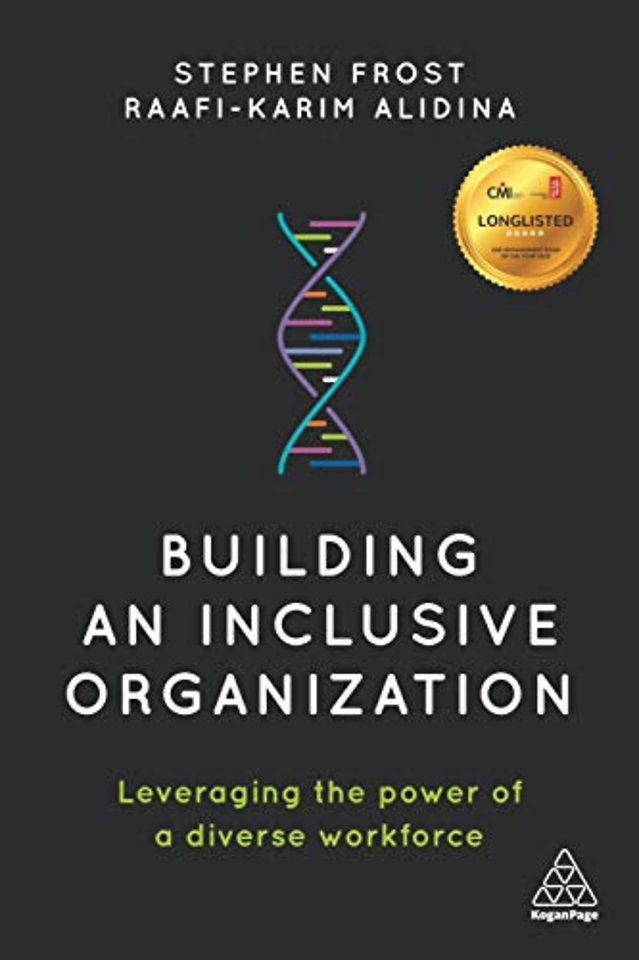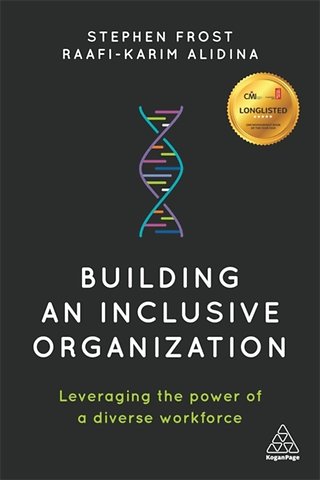


Stephen Frost works with clients worldwide to embed inclusion into their decision making. He teaches at various business schools and was formerly Head of Diversity and Inclusion for the London Organizing Committee of the Olympic Games and Paralympic Games.
Meer over de auteursBuilding an Inclusive Organization
Leveraging the Power of a Diverse Workforce
Gebonden Engels 2019 9780749497774Samenvatting
FINALIST: Business Book Awards 2020 - An Exceptional Book That Promotes Diversity CategoryLONGLISTED: CMI Management Book of the Year 2020 - Society Transformed Category
A diverse workforce is a business imperative. Without it, companies are made up of employees who come from the same background and have the same skills and, therefore, the same blind spots. A diverse workforce brings together different strengths, a variety of experiences, a huge breadth of knowledge and a wealth of creative problem-solving techniques.
However, in order to leverage the benefits of this diverse workforce, businesses must be inclusive. Inclusion ensures that employees feel supported, are treated fairly and are therefore happier, more engaged and more productive. Building an Inclusive Organization is a practical guide to creating an environment of real inclusion.
It explains how to remove unconscious bias from company processes including recruitment and selection, how to make the case for diversity and inclusion to all stakeholders and how to embed inclusion into an organization's culture and overall business strategy. Packed with case studies from organizations including KPMG, Uber, Salesforce, Harvard University and the UK National Health Service (NHS), Building an Inclusive Organization shows how to implement robust processes and policies to foster diversity and inclusion in organizations of any size, and in all sectors, including the creative industry, finance, tech, and academia and foundations.
Guidance and advice is also provided on how to use 'nudges' to change behaviours and overcome bias, how to achieve transparency and accountability, and how to measure, review and evaluate inclusion.
Specificaties
Lezersrecensies
Inhoudsopgave
Acknowledgements xvii
Prologue xix
PART ONE Understand 1
01 Diversity is a reality, inclusion is a choice 3
What the world needs now 3
Norms are not infallible 4
Bias runs rampant 6
Polarization, ‘in’ and ‘out’ groups 7
Empathy facilitates inclusion 11
Zero-sum games 12
Endnotes 16
02 Organizations to the rescue 17
Where business is still missing out 18
Why organizations need to adapt 20
Our maturity model for diversity 21
When diversity is included it’s good for business 24
Inclusive talent management (ITM) 25
Endnotes 32
03 It starts with you 35
Management and leadership 35
Your personal business case 36
Self and role 37
Inclusion is necessary for diversity to succeed 39
Cognitive diversity 42
Defining your own personal ‘why?’ 43
Improving society 45
Endnotes 48
04 Defining the challenge 49
Misdiagnosing the problem 49
Gender pay gaps and how to really close them 50
Applying the wrong solution 55
Unlocking the problem: see no evil, hear no evil, speak no evil 57
Future-scope the problem: diversity is digital 60
Misdiagnosing the solution: tech is not a cure-all 62
Endnotes 66
05 Embracing and challenging bias 67
Types of bias: positive as well as negative, conscious as well as unconscious 68
How to manage your biases 70
Self 75
Role 77
Endnotes 80
PART TWO Lead 81
06 Getting buy-in 83
This is not just an HR issue 84
Figure out the best way in 84
Redefine diversity and inclusion 88
Reframe the conversation 88
Building empathy (across the divide) 89
Reframe inclusion as a leadership concept to draw out its benefits 91
Increase self-awareness and help others increase theirs 92
Deliver: show the promised land 93
Helping men (and others in power) take action 96
Inclusion is for everyone 98
Endnotes 99
07 Designing a plan that will work 101
How to build a meritocracy 101
Developing your plan 102
Strategy 103
Data 107
Governance 109
Leadership 114
Systems 117
Ensuring sustainability: deeds, not words 118
Endnote 119
08 How to make it stick 121
Culture is what you do 121
Nudges 125
Choosing the right nudges 133
Endnotes 134
PART THREE Deliver 137
09 Curating creativity: how to build an inclusive organization in the creative sector 139
Introduction to the creative sector 139
Sector challenges: TV and film 140
Inclusive Leadership Lab 142
Process 143
Sector challenges: classical music 149
The I’m In toolkit 150
Targets 153
Conclusion 153
Endnotes 157
10 Safeguarding norms, challenging norms: how to create change in finance 159
Introduction 159
Sector challenges 160
Buy-in 162
Research 162
Inclusive Leadership Programme 166
Cognitive diversity 168
Transparency and regulation 171
Conclusion 172
Endnotes 176
11 Responsibility, re-invention and revolution: building inclusion in the tech sector 179
Introduction 179
Sector challenges and addressing the pipeline problem 181
Opportunities 183
How startups are a great opportunity for inclusion: Plastiq as a case study 184
Turning things around? The case of Uber 185
Salesforce’s revolution: going beyond D&I to fight for global equality 187
Conclusion 189
Endnotes 191
12 Creating knowledge inclusively: building an inclusive organization in academia and foundations 193
Introduction to academia and foundations 193
Current state of D&I, and resulting challenges 195
Opportunities in these sectors 196
Innovative interventions in academia 197
Process reviews: the US–UK Fulbright Commission 200
Inclusive leadership, organizational engagement and measuring change at the Wellcome Trust 205
Making an impact beyond the organization 208
Endnotes 209
Contents xiii
13 To all organizations: make inclusion part of your purpose 211
Be the change 211
Adapt these interventions to the situation 213
The courage to push your leaders further 214
Practising empathy 216
To be inclusive, be creative 217
Change is already here 218
Endnotes 221
Appendix 1 Example D&I plan 223
Appendix 2 Additional resources 227
Index 247
Vergelijkbare boeken
Anderen die dit boek kochten, kochten ook
Rubrieken
- advisering
- algemeen management
- coaching en trainen
- communicatie en media
- economie
- financieel management
- inkoop en logistiek
- internet en social media
- it-management / ict
- juridisch
- leiderschap
- marketing
- mens en maatschappij
- non-profit
- ondernemen
- organisatiekunde
- personal finance
- personeelsmanagement
- persoonlijke effectiviteit
- projectmanagement
- psychologie
- reclame en verkoop
- strategisch management
- verandermanagement
- werk en loopbaan










